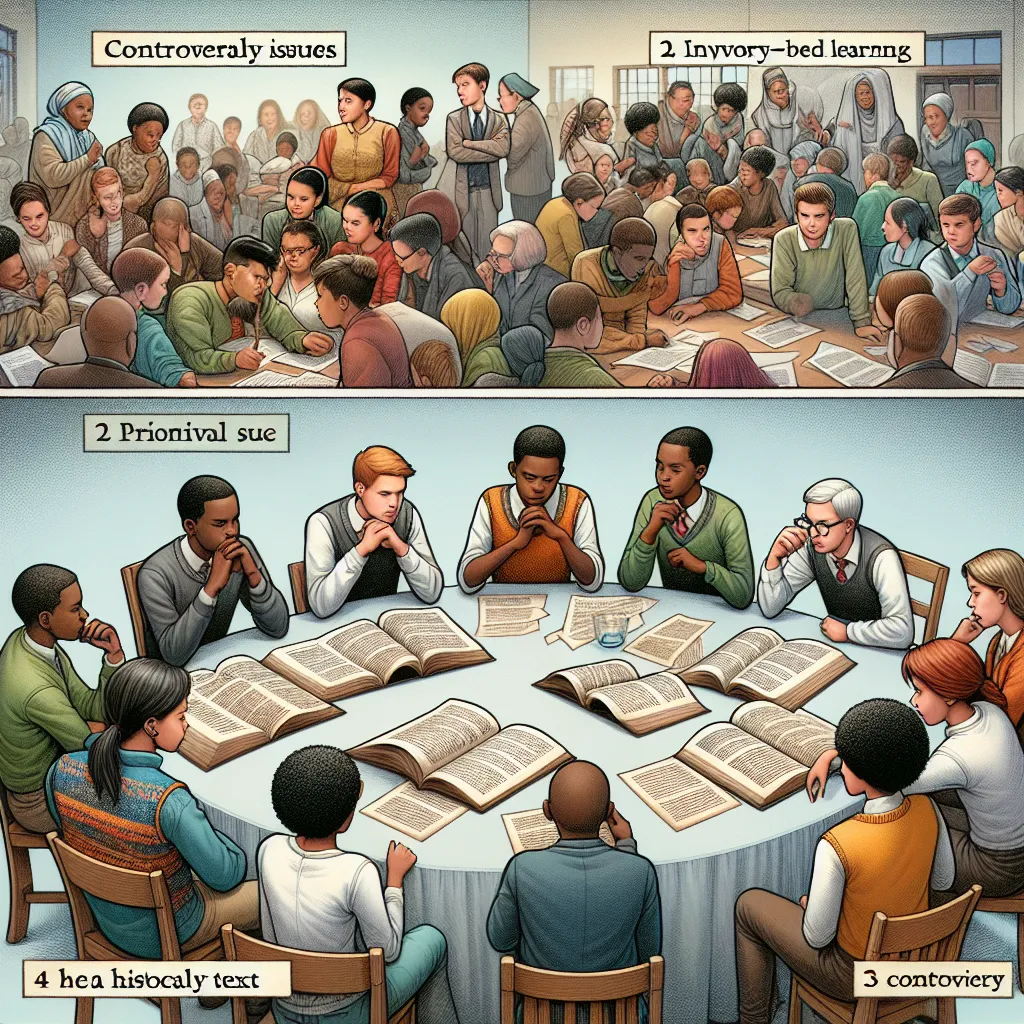Ask AI on The Internet
Question: Teaching controversial issues in SS history, educational outcomes Please include in-text citation APA 7th referencing style and references
### Teaching Controversial Issues in Social Studies History: Educational Outcomes Teaching controversial issues in social studies (SS) history is critical for developing students' critical thinking skills, empathy, and understanding of diverse perspectives. Engaging students with contentious historical issues can lead to several positive educational outcomes, including heightened critical thinking abilities, improved civic competence, and increased engagement in the learning process. #### Critical Thinking Skills One of the primary educational outcomes of teaching controversial issues is the enhancement of critical thinking skills. Students are required to analyze different viewpoints, assess the credibility of sources, and construct well-reasoned arguments. According to Hess (2009), engaging with controversial issues encourages students to question assumptions and consider multiple perspectives, which is fundamental for the development of critical thinking (p. 124). #### Civic Competence Another significant outcome is the development of civic competence. Discussing controversial issues in a historical context helps students understand the complexities of civic life and the importance of informed participation in democratic processes. Parker (2003) argues that controversial issues discussions are essential for the development of democratic dispositions and preparing students for active citizenship (p. 87). #### Engagement and Motivation Controversial topics can also boost student engagement and motivation. When students perceive the material as relevant to their lives and current societal issues, they are more likely to be engaged and actively participate in classroom discussions. According to Barton and Levstik (2004), controversial historical issues provoke interest and stimulate engagement, making history education more effective (p. 203). ### Challenges and Considerations While teaching controversial issues has clear educational benefits, it also presents challenges. Teachers may face resistance from parents or administration, and they must navigate their own biases and those of their students. Hess and McAvoy (2015) suggest that teachers adopt a balanced approach, providing students with a structured environment where diverse opinions are respectably explored (p. 45). ### Strategies for Effective Teaching To effectively teach controversial issues, educators can employ several strategies: 1. **Structured Academic Controversy (SAC)** - This involves students working in pairs to explore all sides of an issue before coming to a consensus (Johnson & Johnson, 1988, p. 32). 2. **Deliberative Discussion** - Encouraging civil discourse where students discuss their viewpoints respectfully and thoughtfully (Parker, 2003, p. 90). 3. **Use of Primary Sources** - Utilizing historical documents to allow students to engage directly with the material and form their own interpretations (Wineburg, 1991, p. 503). #### Conclusion In conclusion, teaching controversial issues in social studies history offers significant educational outcomes in terms of fostering critical thinking, civic competence, and engagement. While there are challenges, with thoughtful implementation, these discussions can greatly enrich students' educational experiences and prepare them for active, informed citizenship. ### References - Barton, K. C., & Levstik, L. S. (2004). *Teaching history for the common good*. Lawrence Erlbaum Associates. - Hess, D. E. (2009). *Controversy in the classroom: The democratic power of discussion*. Routledge. - Hess, D. E., & McAvoy, P. (2015). *The political classroom: Evidence and ethics in democratic education*. Routledge. - Johnson, D. W., & Johnson, R. T. (1988). Critical thinking through structured controversy. *Educational Leadership, 45*(8), 14–17. - Parker, W. C. (2003). *Teaching democracy: Unity and diversity in public life*. Teachers College Press. - Wineburg, S. (1991). Historical problem solving: A study of the cognitive processes used in the evaluation of documentary and pictorial evidence. *Journal of Educational Psychology, 83*(1), 73–87.
Think your answer is better than the AI's? Post it below.
Other Most Relevant Posts:
Question Tags
If you want your question answered by an AI, click here.







Post your own comment: